It’s Father’s Day this month, but what does it feel like when
you don’t have one? Rachel Sullivan (below) reflects on how the loss of hers
has echoed throughout her life
One bright September morning over breakfast, my father told
me a joke I would remember for the rest of my life. I was nine years old, my
brother was ten, and nothing seemed to mark that days out as unusual or
different from any other. My mother, a teacher, was finding socks for my
brother’s PE kit, while my father sat at the Formica kitchen table, cutting
pictures of ice skaters out of magazines for my craft project. “Okay”, he said.
“I bet you 20p that you can’t work out the answer to this. What’s the only
thing worse than biting into an apple and finding a worm?” Matthew and I
started silently at each other for a minute or two before admitting defeat.
“Biting into an apple and finding half a worm”. “Grosssss!” we shrieked
in unison, before rushing out into the daylight to catch the bus that would
take us to school, friends, lessons, life.

Rachel Sullivan
And that was the last time I saw my father. Because later
that day, at the age of 36 – a year younger than I am now – he went up to the
loft of our three- bedroom Victorian house in a nice part of Surrey, and hanged
himself from a beam in the roof. This June will mark the 28th Father’s Day I
have lived through since then – every one spent avoiding greeting cards shops
and trying not to imagine a different version of my own life – and by now, I’ve
got pretty accustomed to being a celebration in which I will always be an
outsider.
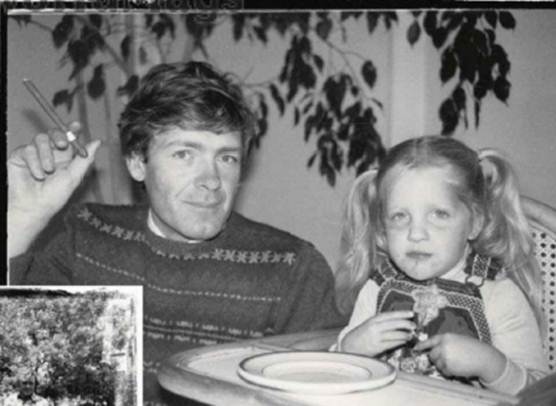
Rachel Sullivan
and her father
That day, as my brother walked and I skipped home down the
road from the bus stop after school, we realised something was wrong. There was
an ambulance outside our house, sirens blazing, neighbours peering out of
windows. And there was our mother, ducking under the yellow tape around our
gate, behaving strangely, not like herself at all, telling us in an odd voice
to go round to a friend’s house and that she would pick us up – later.
Part of me still wishes time could have frozen in that
moment; before Later, before the conversation where she told us that Daddy
loved us, but he couldn’t tell us so himself because he was in heaven; because
Daddy was dead. And that even though he had really loved us, he had done it to
himself, by putting something around his neck, that stopped him breathing, but
it didn’t mean he didn’t love us, and we must always remember that.
Why he did it, I still don’t understand. He had recently
quit his job as a middle-school teacher and my mother said afterwards that she
had known for months that something was deeply wrong: he hadn’t been sleeping,
was saying strange things, became manically fixated on his Catholic faith. She
took him to see the priest, the family doctor; both said he was fine. He
probably just needed a holiday. But he wasn’t fine – he was suffering from some
undiagnosed form of depression, or anxiety, or both; no one really knows. These
days, we are all very well versed in the language of mental illness: there’s no
shame in shrinks, self-help books, Prozac. But for my father, all this came too
late.
I see that now, but as a nine-year-old, I wasn’t capable of
making sense of long division, let alone making sense of what he did that
afternoon. No one wants to watch a child grieve – surely, there couldn’t be
anything more heartbreaking for an adult – and no one truly encouraged me to
express how I felt. Instead, there were endless question. Do you want a bar of
chocolate? Do you want to go and watch the penguins at the zoo? Do you want to
see Daddy’s body before they bury him? That was an easy one to answer,
at least. I couldn’t think of anything worse. Still can’t.
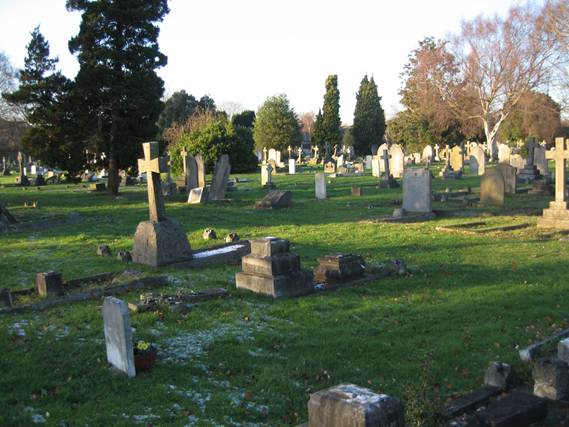
We went to the
grave a lot to start with, but I always hated it. Because, especially to a
child, a cemetery is a cold, frightening place, full of grief and tragedy
Not long after that, I remember simply shutting down;
stopping feeling anything. At my father’s funeral, packed full of confused
children and weeping grown-ups, I started to cry, too. “Don’t cry here, in
front of everyone,” my mother said to me, gripping my hand so hard I thought
the bones might break. “We’ll all cry together when we get home – just the
three of us.” But of course, we never did. Instead, we did what we were quickly
learning would hurt the least and discussed something practical: what we should
write on Daddy’s headstone. What flowers we should plant. I never did ask my
mother why she told me not to cry that day. My best guess is that she was only
just holding it together and feared that this might have sent her over the
edge.
We went to the grave a lot to start with, but I always hated
it. Because, especially to a child, a cemetery is a cold, frightening place,
full of grief and tragedy. It doesn’t matter how much you sit there and talk to
that uneven mound of earth, or cry, or strike bargains with God; even if you
manage to feel, just for a second, like that person is with you, the truth is,
they’re not. Sooner or later, the sun goes down or your parking runs out or
you’re going to be late for dinner – you have to leave them behind.
Because they are dead and you are not, and you have to find
a way of going on living. And, gradually you do – you think about them less and
less, and sometimes not at all, and you become interested in boys, and watching
gymnastics, and books by Evelyn Waugh, and a million easier distractions. And
that’s when you really leave them behind: that gravestone starts to feel
like a measurement of the dying away of your grief. Your weekly trips to the
cemetery happen less and less often, until they become just a twice-yearly
pilgrimage of guilt where you clear away a bunch of dead flowers you’ve never
seen before and you wonder who else, after all this time, could still be coming
to see your father? And then you check your watch, even though you
haven’t really got anywhere else to be, and you shiver, wrap your coat more
tightly around yourself, and head for home, headphones in, music turned up
full. And even though it makes you feel desperately empty, you know this is
progress.
Many coping strategies got me through that time, most of
which won’t surprise anyone who’s on first-name terms with grief. Fantasising
was my chief drug of choice. I was constantly lost in elaborate scenarios based
around one thing: that my father was actually alive and the whole silly
business of pretending he was dead had been necessary for some perfectly
explicable reason. My favourite: that he was a member of the IRA (in my
defence, I didn’t really understand who they were) who was on the run from some
faceless villain – and all this, the police, the funeral, everything, had been
the only way of ensuring his safety. There were a thousand other variations on
this story, but I’m sure you can imagine how they all ended: the tears
streaming down my father’s face, my mother rushing towards him with open arms,
him enveloping me in a hug so big, it would make all the bad things go away.
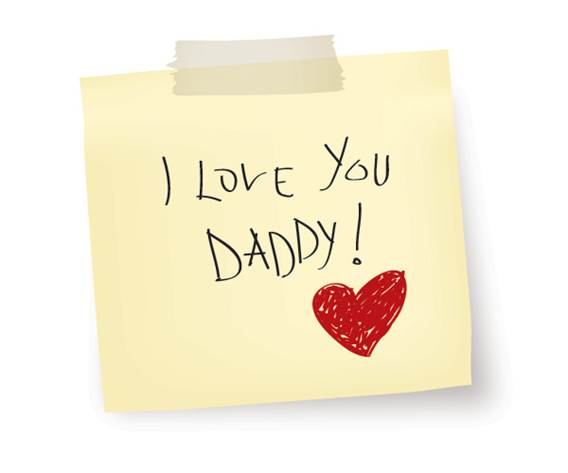
I was constantly
lost in elaborate scenarios based around one thing: that my father was actually
alive and the whole silly business of pretending he was dead had been necessary
for some perfectly explicable reason.
The other coping strategy I found useful was lying. It was
almost impossible to speak the sentence, “Daddy committed suicide,” so I just –
stopped. Instead, I’d make something up, a heart attack, a bicycle accident,
maybe even a weird cancer – anything that seemed a little less shocking, a
little more palatable, less likely to offend. Kids can be brutal, and they spot
someone ‘different’ a mile off – with the dead father and the habit of starting
vacantly into the distance for long periods of time, I was at risk of sticking
out like a sore thumb. And I didn’t like that very much, so I started
pretending to be just like everyone else. I’d read the books they read and
laugh at the things they seemed to find funny. I never talked about my father
and I certainly never talking about my feelings.
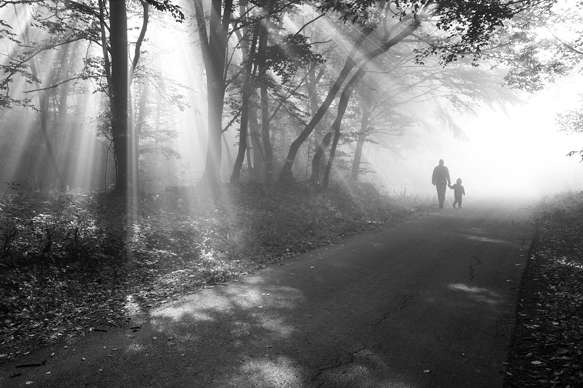
What do you lose
when you lose your father?
So, what do you lose when you lose your father? First of
all, there are the practical things: someone who shows you how to change the
oil in your car, or helps you put up shelves in your first flat. And that’s a
surprisingly huge loss, which echoes throughout your life. But the emotional
stuff is harder to define. It’s difficult to analyse something you’ve never
really had, but I did sometimes look at my friends’ relationships with their
fathers and wonder what might have been. Mothers and daughters have close,
complex, occasionally competitive relationships, but what a daughter seems to
get from her father – which I guess I missed out on – is a kind of
unquestioning, uncomplicated adoration. My father used to tell me stupid jokes
and silly stories and I remember missing that very much. He would sometimes
swear at other drivers and make my brother and me giggle uncontrollably in the
back of the car, and I missed that, too. And when I had a nightmare, he would
come and sit with me, sometimes for hours, until I went back to sleep. When one
parent is gone, as a child, you feel terribly exposed. I used to worry for
hours about what would happen if my mother died, too, where Matthew and I would
live, and whether I would still be able to have my rabbit there.
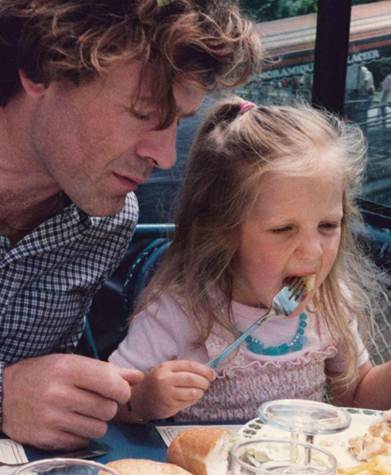
“You carry that
frightened, betrayed and confused nine-year-old around with you forever”
I do know what it is to have a parent die in the normal run
of things, because I was unlucky enough to lose my mother to cancer when I was
32. And that was incredibly tough, and involved grieving, and I thought I’d
never feel like myself again, and then I did. But to lose a parent when you are
so young – so unable to react and process it – that’s another thing altogether.
Because if that happens, you carry that frightened, betrayed, confused,
disorientated nine-year-old around with you forever. She’s there when you can’t
sleep away from home because, for some reason, you feel scared; she’s there
when people ask how you are, and you say you’re fine, even though you’re
anything but; and she’s there when you fall in love repeatedly with men who you
know will let you down, just like he did.
And I did do all those things for a while. But not any more.
After my mother died, I found a great counsellor. It took time, and many tears,
and a lot of talking about things I’d tried hard to forget, but it really
helped. I think my story, in the end, is a positive one. When something like
this happens to you as a child, you have to fight hard to get back to where you
should have been, but I’m the living proof that it is possible. I’m getting
married this month to a man who loves me unconditionally. I struggle with the
notion of Happy Ever After – it’s been my experience that mean old life has a
callous habit of getting in the way of such a nice idea – but I’m Happy Right
Now, and that’s good enough. I have a career that fulfills me, a home, great
friends and a small, ridiculous dog who makes me laugh every day. Yes, loss
could still haunt my life, if I chose to let it, but most days – most days
– I manage to choose not to. I have friends who’ve also lost their fathers and
say they couldn’t bear the thought of a wedding: walking down the aisle without
the arm of the person they always imagined would be there. I understand that,
but I also don’t see why I should add to my life’s losses by not having the
big, warm, friend-filled, love-filled wedding I have always wanted. And the
hand I’ll be holding as I walk into my future will be that of the person who
shared that dreadful day back in 1983 with me – my brother. What happened to my
father, and therefore to us, was sad and tragic and difficult. But I can think
of something worse: for me to look back one day and realise I only lived half
the life I was meant to live.